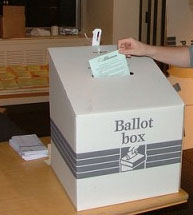Last Tuesday was election day in many parts of the country. Right now, you may be celebrating or thumping your head on your desk in disbelief. But were those election results proof that, like it or not, the country favors certain policy positions? Maybe not.
I’m going to list the top two contenders in a variety of races. I’m not going to tell you their views on taxes, guns or abortion. I won’t say whether they have a position on gay marriage or marijuana. I won’t even tell you to which political party they belong. I’m just giving you their names. Oh and I'll tell you one other thing about them.
See if you can pick the winner of each race.
Governor of Virginia
Terry McAuliffe—raised $35 million
Ken Cuccinelli—raised $20 million
Lieutenant Governor of Virginia
Ralph Northam—raised $2.3 million
E.W. Jackson—raised $1.2 million
Governor of New Jersey
Chris Christie— spent $11.5 million on TV and radio ads
Barbara Buono—spent $2.1 million on ads
Alabama 1st Congressional District primary
Couldn’t find actual figures for this race, but here's a spending ratio
Bradley Byrne—2
Dean Young—1
Mayor of New York City, New York
Bill de Blasio—$1.4 million in bundled contributions
Joe Lhota—$481,000 in bundled contributions
Mayor of Boston, Massachusetts
Martin Walsh—raised 1.8 million but got close to $3 million from outside groups
John Connolly—raised 1.9 million, got less than $1 million from outside groups
Mayor of Kentwood, Michigan
Stephen Kepley—raised $33,239
Sharon Brinks—raised $28,482
If you guessed that the top candidate in each pairing won, you’re right!
Regardless of the issues, the demographics of the electorate, or the competency of the candidates, the person with more money at his disposal won. Does that sound like your idea of democracy?
It doesn't have to be this way. Groups like Wolf-PAC are working to get a 28th Amendment to the Constitution, forever severing the connection between money and politics. Maybe then, our representatives will actually represent us.
